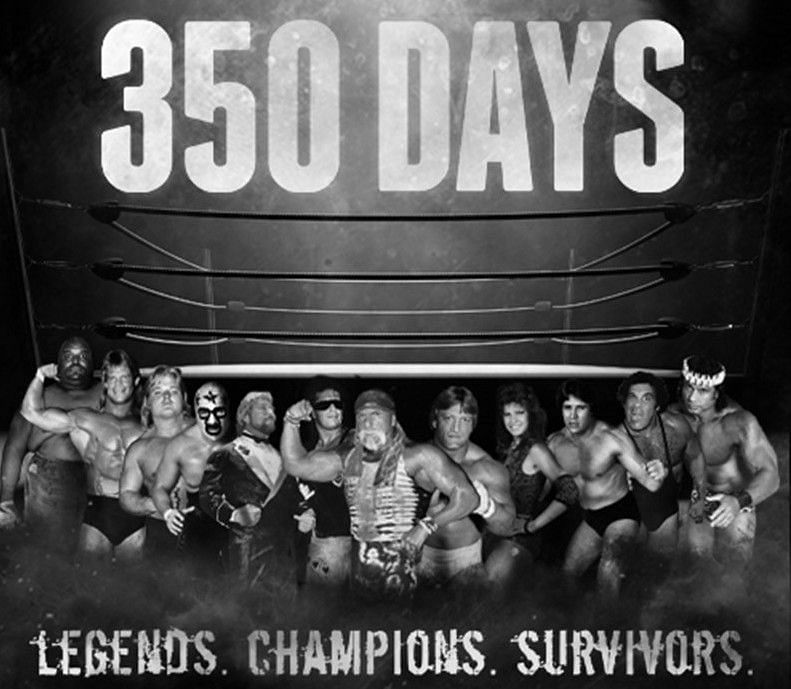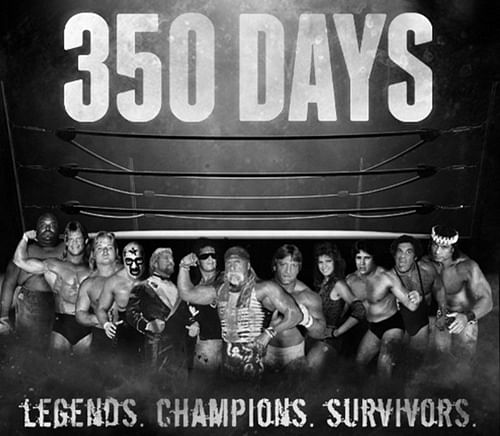
Greg "The Hammer" Valentine & filmmaker Evan Ginzburg on the new film "350 Days"

American pro wrestling fans have a “must-see” one-night event coming this summer as 350 Days hits movie theatres nationwide on Thursday, July 12, 2018. Starring former world champions Bret Hart and “Superstar” Billy Graham, the documentary provides a behind-the-scenes look at the gruelling life that many professional wrestlers led on the road and the subsequent effect that this lifestyle had on their marriages, family, physical and mental health.
Beyond the aforementioned Hart and Graham, 350 Days also has exclusive interviews with Greg "The Hammer" Valentine, Tito Santana, Paul “Mr. Wonderful” Orndorff, Abdullah The Butcher, Wendi Richter, Bill Eadie, Nikolai Volkoff, Lanny Poffo, Stan Hansen, Angelo Mosca, and Lex Luger. 350 Days also includes some of the last interviews ever done with George “The Animal” Steele, Jimmy “Superfly” Snuka, Ox Baker, The Wolfman, “Pretty Boy” Larry Sharpe, Don Fargo, and Angelo Savoldi.
To learn more about this one-night event, I spoke with Greg "The Hammer" Valentine and 350 Days producer Evan Ginzburg -- who also served as Associate Producer of the Academy Award-nominated film The Wrestler -- by phone. More on 350 Days and its Fathom Events showings can be found online at www.fathomevents.com.
Had you two worked together before the documentary? Had you been on Evan's show, Greg?
Greg Valentine: Yes, I've known Evan for a long time, we've done a lot of different things.
Had you worked on any projects together that you can talk about?
Greg Valentine: We're in the midst of trying to get my dad's book out. Also, I did a documentary about The Junkyard Dog, we did together.
Evan Ginzburg: Yes, that's gonna be out down the road.
A lot of people I've heard compare this new documentary to The Wrestler, which Evan worked on. Is it safe to say that the documentary is the real-life version of The Wrestler?
Evan Ginzburg: Yes and no. We interviewed 72 people, I believe. 38 made the final cut. Some are very successful and well-off and others aren't. Not everyone is Randy The Ram [style] characters, some could be comparable. Everyone is in a different situation.
When you're getting the true stories of people like you did, were there anyone you felt wound up a little too happy or well-off to fit into the documentary?
Evan Ginzburg: Michael Burlingame is the editor. Michael worked with Paul McCartney, Sting, HBO, and he's an Emmy Award-nominated editor. When we started the project, we said to Michael, "Find the most powerful, poignant stories." They weren't all grim or tragic. Ox Baker's in there and he's very upbeat and positive and cooking.
It wasn't a matter of "too happy or too sad," it was finding a balance where you're telling the stories of being on the road 350 days a year. Greg obviously can tell it better than I can. (laughs) It takes a toll on marriages, family, relationships with kids, your own body, etc.
Greg Valentine: Yeah, exactly what Evan said. The toll on bodies, being on the road... I go way back to the seventies when we didn't fly much. We drove and drove, instead of flying everywhere like we did in the eighties. It was all on the road and it's a lot of wrestling. I don't know if I did 350 days, but it was close.
In the WWF, which is WWE now, we did 10 days straight, then we had 3 days off, then we went out for 4 more days straight, then we had 3 days off, then we did 10 days straight. If we went to Europe or Japan, it was like 2 weeks straight flying over there and flying back. A lot of road stuff, a lot of aeroplanes.
An interesting thing about you, Greg, is the length of your career. You were there through the Rock & Wrestling era, also there through when it became more of a reality-based product. When did you find that it was fine to start breaking character and show your real personality?
Greg Valentine: I guess after I got out of the WWF and after I got out of WCW, when I was doing independent shows, I still kept my character. Then when I started doing autograph shows and Comic-Cons, which are virtually all over the place, I did a lot of those too and I interacted with fans to sign autographs, then I break character. "Oh, you're such a nice guy." (laughs) Instead of being an S.O.B. or whatever.
That was my character in the ring and I tried to do that. Going through the airports I was really quiet, didn't really talk to people, but I never turned down an autograph, no matter how nasty I was supposed to be.
Evan, in your case, when did you find wrestlers start to be receptive to doing shows like yours? As I mentioned earlier, it used to be about never breaking character or doing anything the boss didn't approve of.
Evan Ginzburg: I would honestly say that the big change was when Vince McMahon, of all people, exposed the business. He went public with it and at that point, what was there to hide? The Internet hit strong and at that point, it was wide open. I would look at Vince if anybody.
Greg Valentine: I used to have these matches with Tito Santana where we beat the hell out of each other. 99 of the matches were real punches, we did everything to make people believe that wrestling wasn't B.S. Then he [Vince] goes to court, just because he doesn't want to pay for commission fees. Fine, he wasn't in there getting the crap beat out of him every night, I was. I was appalled by that... For lack of a better term, it really pissed me off.
Do you feel that The Wrestler sets the record straight about your old lifestyle? Or is there more that you still want to share about how things used to be?
Greg Valentine: I thought that movie was great, Mickey Rourke did a hell of a job. I went in for a few interviews with [Darren] Aronofsky at his place... He said that he used to come to watch me wrestle and stuff. It looks close, but it was "This guy was a big star and now he's doing independent shows." It's pretty realistic. It's a movie, of course, but I would give it props as far as being a pretty darn good movie.
Evan Ginzburg: Basically as the associate producer, I took Aronofsky and the screenwriter and executive producer to indie show every weekend for 6 months. Darren wanted it to ring true. He really wanted to capture it and he, like Greg said, he interviewed him early on. I met with Darren very early on with Nikolai [Volkoff] and Johnny Valiant -- who recently passed, tragically - and various other wrestlers. I remember Darren speaking for a long time with [King Kong] Bundy, off and on with various guys. He really wanted to capture it.
Similarly, with this movie 350 Days, we wanted it to ring true. There's no narrator in this movie. Every word is coming from the wrestlers themselves. There's no editorializing, there's no fictionalizing.